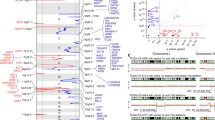Abstract
TUMOUR progression is a fundamental feature of the biology of cancer1. Cancers do not arise de novo in their final form, but begin as small, indolent growths, which gradually acquire characteristics associated with malignancy. In the brain, for example, low-grade tumours (astrocytomas) evolve into faster growing, more dysplastic and invasive high-grade tumours (glioblastomas)2,3. To define the genetic events underlying brain tumour progression, we analysed the p53 gene in ten primary brain tumour pairs. Seven pairs consisted of tumours that were high grade both at presentation and recurrence (group A) and three pairs consisted of low-grade tumours that had progressed to higher grade tumours (group B). In group A pairs, four of the recurrent tumours contained a p53 gene mutation; in three of them, the same mutation was found in the primary tumour. In group B pairs, progression to high grade was associated with a p53 gene mutation. A subpopulation of cells were present in the low-grade tumours that contained the same p53 gene mutation predominant in the cells of the recurrent tumours that had progressed to glioblastoma. Thus, the histological progression of brain tumours was associated with a clonal expansion of cells that had previously acquired a mutation in the p53 gene, endowing them with a selective growth advantage. These experimental observations strongly support Nowell's clonal evolution model of tumour progression4.
Similar content being viewed by others
References
Foulds, L. Neoplastic Development Vols 1 and 2 (Academic, London, 1969 and 1975).
Scherer, H. J. Amer. J. Cancer 40, 159–198 (1940).
Russel, D. S. & Rubenstein, L. J. in Pathology of Tumors of the Nervous System 4th edn 226–228 (Williams and Wilkins, Baltimore, 1977).
Nowell, P. Science 194, 23–28 (1976).
James, C. D. et al. Cancer Res. 48, 5546–5551 (1988).
Bigner, S. H. et al. Cancer Res. 48, 405–411 (1988).
James, C. D. et al. Proc. natn. Acad. Sci. U.S.A. 86, 2858–2862 (1989).
Nigro, J. M. et al. Nature 342, 705–708 (1989).
Baker, S. J. et al. Science 244, 217–221 (1989).
Hollstein, M., Sidransky, D., Vogelstein, B. & Harris, C. C. Science 253, 49–53 (1991).
Sidransky, D. et al. Science 252, 706–709 (1991).
Kerbel, R. S. Adv. Cancer Res. 55, 87–132 (1990).
Bishop, J. M. Cell 64, 235–248 (1991).
Fearon, E. R. & Vogelstein, B. Cell 61, 759–767 (1990).
Author information
Authors and Affiliations
Rights and permissions
About this article
Cite this article
Sidransky, D., Mikkelsen, T., Schwechheimer, K. et al. Clonal expansion of p53 mutant cells is associated with brain tumour progression. Nature 355, 846–847 (1992). https://doi.org/10.1038/355846a0
Received:
Accepted:
Issue Date:
DOI: https://doi.org/10.1038/355846a0
- Springer Nature Limited
This article is cited by
-
Transition of amyloid/mutant p53 from tumor suppressor to an oncogene and therapeutic approaches to ameliorate metastasis and cancer stemness
Cancer Cell International (2022)
-
Extrinsic cell death pathway plasticity: a driver of clonal evolution in cancer?
Cell Death Discovery (2022)
-
Regulated intratumoral expression of IL-12 using a RheoSwitch Therapeutic System® (RTS®) gene switch as gene therapy for the treatment of glioma
Cancer Gene Therapy (2018)
-
Key rates for the grades and transformation ability of glioma: model simulations and clinical cases
Journal of Neuro-Oncology (2017)
-
Crosstalk Between Macroautophagy and Chaperone-Mediated Autophagy: Implications for the Treatment of Neurological Diseases
Molecular Neurobiology (2015)





